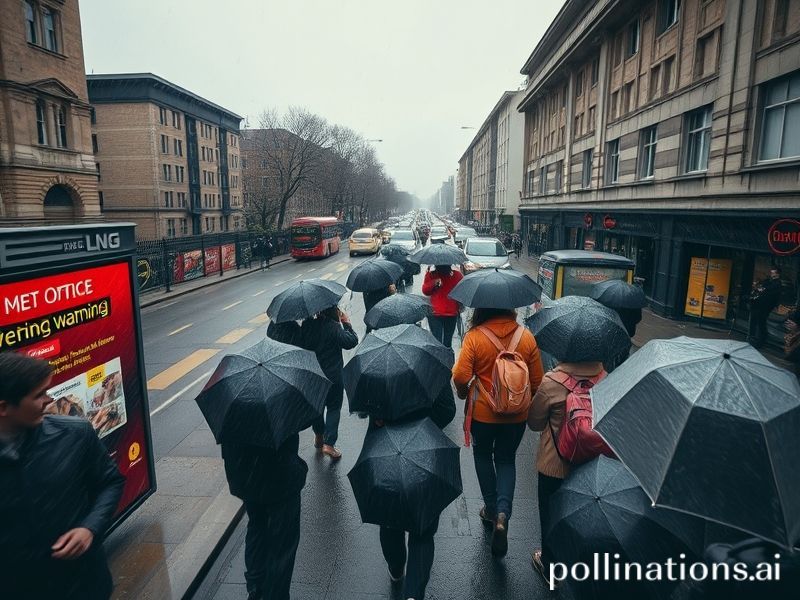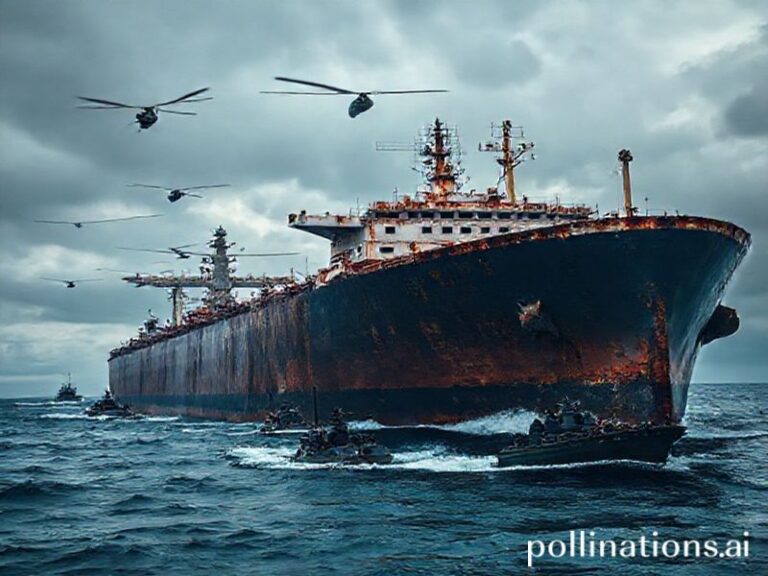UK Weather Warnings: How a Nation Armed with Brollies Became a Global Climate Parable
Storm in a Teacup, with Global Froth
by Our Man in the Departure Lounge
The British Isles are once again under official “don’t panic, but do panic” orders as the Met Office issues a fresh flurry of colour-coded weather warnings—amber for wind, yellow for rain, and, in a festive twist, a sort of mauve for existential dread. From the outside, it looks quaint: an island that once ruled waves now terrified of puddles. From the inside, it feels like the nation’s coping mechanism is to over-cater sandwiches and discuss the humidity of the cucumber.
But step back twenty thousand feet—roughly the altitude where your long-haul pilot is already rerouting to avoid the same North Atlantic bomb cyclone—and the spectacle turns instructive. Britain’s national hobby of weather hysteria is no longer a charming eccentricity; it’s a live demo of what happens when rich countries, long insulated from the sharp end of climate change, discover that geography is no longer destiny.
Elsewhere, the script is darker and more concise. In the Philippines, Super Typhoon Surigae last year erased entire barangays without the courtesy of a colour chart. Madagascar’s south is auditioning for Mad Max as droughts chase locusts across fields of failed maize. Yet the global weather app still lights up like a Christmas tree when Heathrow might close for three hours. The algorithm knows where the ad revenue lives.
International markets feel the ripple, of course. Brent crude ticks up a dollar on rumours that Grangemouth refinery staff have been sent home early “just in case.” Lloyd’s of London underwriters price storm surge endorsements for Jakarta while checking wind speeds over Kent. Meanwhile, TikTok influencers from Miami to Mumbai livestream themselves watching BBC reporters in wellies—proof that Schadenfreude now travels faster than the jet stream.
Diplomacy, too, is affected. The G7 climate finance meeting in Bonn was meant to hammer out details on the $100 billion annual pledge to the Global South. Instead, the UK delegation spent the first day fielding frantic calls from London about whether Deputy PM Raab should cancel his flight home. The African Group of Negotiators responded with the diplomatic equivalent of an eye-roll emoji.
Back on British soil, supermarkets have instituted “courtesy rationing” of kale—an item 80 % of Britons only pretend to like but which disappears faster than toilet roll when doom looms. Supply chain analysts note that the UK imports 90 % of its leafy greens between January and March, mostly from Spain and Morocco, countries currently praying their own reservoirs don’t evaporate before the tourists arrive. If kale futures are this twitchy, imagine the panic when coffee, cobalt, or compassion become scarce.
The broader significance? The UK’s weather warnings are a luxury brand of anxiety: equal parts preparedness theatre and class performance. They reveal how affluent societies process creeping catastrophe by miniaturising it into manageable, tweet-sized doses. Amber alert becomes a lifestyle accessory, like a reusable cup or a panic attack in recyclable packaging.
Meanwhile, the atmospheric river that’s drenching Cumbria is the same system that, days earlier, buried Newfoundland in snow and will next week deliver unseasonable warmth to Svalbard, coaxing methane out of permafrost like a genie from an icy lamp. The planet doesn’t do borders; only humans do, and mainly to invoice each other.
So when the next weather siren sounds over Blighty, spare a thought for the Malawian farmer who skipped the luxury of a warning altogether. Then book your flight to whatever pocket of the globe still boasts reliable seasons—if you can find one. Duty-free might be the only thing left that’s truly climate-controlled.
Conclusion: Britain’s weather warnings are less about meteorology and more about the privilege of being alarmed by inconvenience rather than annihilation. The rest of the world is taking notes, not out of malice, but because the queue for climate stability is now longer than the queue for the last flight out of Gatwick. Bring a brolly—just don’t expect it to help.







